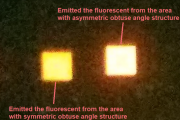 2019-02-21
2019-02-21
The way fireflies light up their lanterns has become an inspiration to increase the efficiency of LED. Researchers at the Pennsylvania State University (Penn State) found out that LEDs made with firefly-mimicking structures could improve lighting efficiency.
Enhancing luminous efficiency of LED has been a research field for many scientists. Stuart (Shizhuo) Yin, professor of electrical engineering at Penn State, noted, "Overall commercial LED efficiency is currently only about 50 percent. One of the major concerns is how to improve the so-called light extra...
Continue reading →
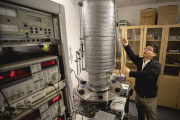 2019-02-15
2019-02-15
Researchers found a new method of photonic cooling by running LED with electrodes reversed. Researchers believe that this approach could improve cooling technology for future microprocessors, which will include various transistors in a small space that current methods cannot remove heat quickly enough. The finding was published on Nature on February 13 by a research team at the University of Michigan.
Linxiao Zhu, the lead author on the research article, explained, “Usually for thermal radiation, the intensity only depends on temperature, but we actually have an additio...
Continue reading →
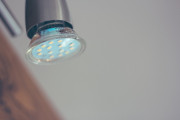 2018-12-05
2018-12-05
An international team discovered a single material which produces white light to improve LED lighting efficiency. The renewable energy research was recently published in Nature with the article contributed by researchers from The University of Toledo, Monash University, Jilin University, University of Toronto, Tsinghua University, Chinese Academy of Sciences and Wuhan University.
(Image: Pixabay)
Dr. Yanfa Yan, professor of physics at The University of Toledo, explained, "Due to its high efficiency, this new material can potentially replace the curre...
Continue reading →
 2018-12-05
2018-12-05
Researchers at the Barcelona Institute of Science and Technology have developed LEDs comprising infrared colloidal quantum dots that enable high efficiency and low cost CMOS integration. Colloidal quantum dots are extremely small semiconductor particles which are as small as a few nanometers in size. Featured with small size, CQDs offer unique optical and electronic properties including absorbing and emitting light. Moreover, their properties change with their size and shape, smaller quantum dots emit in the blue range while larger quantum dots emit in the red. (Ima...
Continue reading →
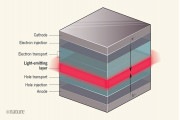 2018-11-23
2018-11-23
Scientists have developed several types of LED including OLEDs, quantum-dot-based LEDs (QLED), perovskite-based LEDs and Micro LEDs for the purpose of enhancing the brightness, contrast and resolution of displays as well as to reduce the production cost and energy use. A new research published on Nature has illustrated a development of OLEDs using free radicals which generate doublet emission with higher efficiency.
In the research, scientists from China and the UK have demonstrated radical-based OLEDs that could reach an external quantum efficiency of ...
Continue reading →
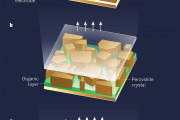 2018-10-12
2018-10-12
Scientists have continuously worked on improving the performance of LED. LED based on Perovskite (PLED) could be a new approach. Scientists have found out that the performance of the material surpasses OLED and that it could be processed with low cost solutions. Two research teams have published their studies of perovskite LED on Nature in October, notifying the potential of its further development.
Continue reading →
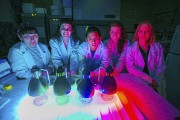 2014-04-22
2014-04-22
There was a time when no one thought about light bulbs—one blew, you screwed another one in. Nowadays, it’s more complicated, as energy efficiency concerns have given rise to a slew of options, including incandescent, compact fluorescent lights, and LEDs.
Continue reading →
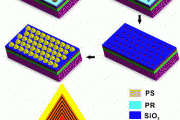 2014-04-11
2014-04-11
For the cool white NPW LEDs, the spectrum is similar to the conventional white LEDs obtained from the blue LEDs combined with yellow phosphors. The blue emission originates from the upper sidewalls of nanopyramids, and yellow light is mainly emitted from the lower ridges with respect to the base of nanopyramids.
Continue reading →
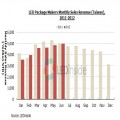 2012-07-12
2012-07-12
According to LEDinside, the LED research division of TrendForce, the June revenues of Taiwanese listed LED manufacturers totaled NT$8.8 billion (MoM+1.12%, YoY-5.6%). Benefiting from the climbing demand for consumer electronic appliances and the traditional lighting peak season, the LED industry’s 2Q12 revenue reached NT$25.82 billion (QoQ+22.7%). Looking towards the second half of 2012, the LED industry will face a severe challenge – affected by the lukewarm economic outlook and the European debt crisis, the future for end market does not seem b...
Continue reading →
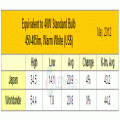 2012-06-21
2012-06-21
According to the latest price survey by LEDinside, the LED research division of TrendForce, in May 2012, global LED light bulb price basically remained stable without dramatic fluctuations. 40W equivalent LED light bulb ASP saw no remarkable changes as prices of existing products around the world kept flat or slightly dropped while general prices of new arrivals were relatively high. On the other hand, 60W equivalent LED light bulb ASP dipped by 1% to USD 33.5, price falls mainly occurring in Korea and UK. 40W equivalent LED light bulb: prices o...
Continue reading →
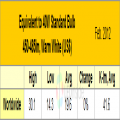 2012-04-24
2012-04-24
ASP of 40W equivalent LED light bulb slid below US$20 in U.S. According to the latest survey conducted by LEDinside, the LED research division of TrendForce, the global LED light bulb price continued to dip in 12’Feb, but the downtrend has curbed – the ASP of 40W equivalent LED light bulb merely dropped 0.1%, while the ASP plummeted by 19% in the United States to below US$20. The global ASP of 60W equivalent LED light bulb dropped to US$33.6, and the price downtrend was most prominent in the United States and Japan. ASP ...
Continue reading →
 2019-02-21
2019-02-21
 2019-02-15
2019-02-15
 2018-12-05
2018-12-05
 2018-12-05
2018-12-05
 2018-11-23
2018-11-23
 2018-10-12
2018-10-12
 2014-04-22
2014-04-22
 2014-04-11
2014-04-11
 2012-07-12
2012-07-12
 2012-06-21
2012-06-21
 2012-04-24
2012-04-24